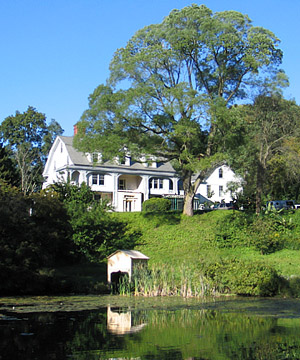The Roslyn Landmark Society hosted a lecture on behalf of the Friends of Cedarmere group last Wednesday to educate the community on the legacy of poet and journalist William Cullen Bryant and the dwindling estate which bears his name.
Harrison Hunt, the former supervisor for historic sites for the county parks department as well as a Bryant historian, spoke in front of a packed lecture hall at the Atria in Roslyn Harbor to inspire the community to help restore the property in hopes of seeing the Cedarmere Museum re-opened for public visitation.
“On a national scale, William Cullen Bryant is probably the second most important person, after Theodore Roosevelt, to have lived in what is now known as Nassau County,” Hunt said in a phone interview with Blank Slate Media.
In 1994, the Nassau County Parks Department opened the site’s main house as the Cedarmere Museum, in commemoration of the bicentennial of Bryant’s birth.
But since its close in 2008, around the same time he retired from his position with the parks department, Hunt said the grounds have been neglected and often vandalized.
In addition, Hunt said that over the years, more than 50 windows have been destroyed, other buildings on the estate have been broken into, a statue from one of the gardens has been stolen and the bridge that crosses the estate’s pond has been damaged.
Though remnants of the Bryant estate are now used for the site of the Nassau County Museum of Art in addition to the Cedarmere Mill and Dewey Cottage, which were each restored by the landmark society last year with financial backing from the Gerry Trust, Hunt said there is still more work to be done.
“We want people to know who that guy [Manhattan’s] Bryant Park is named after, and we want them to be able to come to his home and enjoy the grounds just as he did,” Hunt said.
Bryant made his fortune as a partial owner of the New York Evening Post, which served as the precursor to the New York Post, after starting at the newspaper as a writer and working his way into the editor-in-chief role by the late 1820s.
In 1843, Bryant purchased 40 acres of property in what is now known as Roslyn Harbor, and by the time he died in 1878 the property had expanded to approximately 200 acres.
Hunt said Bryant aided in the estate’s design, from planting and maintaining various fruit trees and cultivating a working vegetable farm on the grounds.
“He looked at Cedarmere as his primary home even though it was technically his country home,” Hunt said. “He never did newspaper work at Cedarmere. That was where he came to relax and write his poetry. He also had a love of horticulture and he liked to entertain. Sometimes, he wrote of all the would-be poets that would come knocking at his door with their huge manuscripts, hoping that he’d read them.”
Toward the end of his life, Bryant helped fund and establish what is now called Bryant Library, then called ‘The Hall,’ was a leading proponent for the creation of Central Park, and was a founding member of the Metropolitan Museum of Art.
In the late 1870s, the name “Nassau” narrowly beat out “Bryant” for the county’s namesake, Hunt said.
After his death, Bryant’s property was split between his two daughters. Half the estate was eventually sold and turned into a housing development in the 1950s, while the other half was gradually sold down to approximately seven acres and became county property in 1975.
“William Cullen Bryant was of immense importance nationally, and to New York in terms of the arts and efforts for civic reform, so having him in Roslyn really is having a major American figure living in our midst,” Hunt said.
Hunt said the friends of Cedarmere have made an agreement with Nassau County officials to replant the gardens in accordance with how Bryant maintained the property, with planting expected to begin in early June.
Eventually, he hopes Long Islanders will be able to experience the property as Bryant once did.
“It’s a beautiful site. Bryant chose very well,” Hunt said. “It should be brought back to top-notch conditions so the public can enjoy it.”



